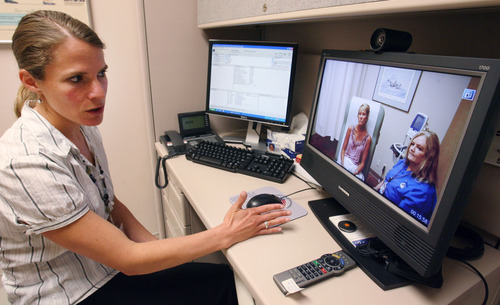This is an archived article that was published on sltrib.com in 2012, and information in the article may be outdated. It is provided only for personal research purposes and may not be reprinted.
It's not right for all patients in all scenarios. But sometimes a dose of broadband is just what the doctor ordered.
That's Susan Rose's assessment of telemedicine, an increasingly popular means for reaching patients in remote areas where specialty care can be in short supply. Salt Lake City's Veterans Affairs hospital has added basic obstetric and gynecological care to its quiver of tele-health offerings. Rose, the hospital's sole obstetrician and gynecologist, demonstrated the technology on Thursday.
To her left was a computer capture of a mock-patient's chart. Facing her was the televised image of a woman — a staffer playing the role of a patient — sitting in one of the VA's community clinics, 230 miles away in Elko, Nev. The visit went like any other, with Rose asking questions about the woman's symptoms and medical history.
Rose isn't yet equipped to do physical exams, though technology allows it. VA doctors in other departments are able to guide staffers through tweaks of hearing and measurements of patients' vital signs. They can diagnose skin disorders and transmit radiology images over the airways. Mental health professionals can more easily consult with patients in crisis.
"It's an emerging technology. It won't replace face-to-face time, but it spares patients from taking time away from work and family. It's a way to let our women veterans know we are here for them, that we care," said Rose.
Women veterans tend to seek care from private clinics instead of the Veterans Health Administration, in part because the services they need weren't available until recently.
Utah's VA has operated a women's clinic for 14 years, and Rose is said to be the only practicing OB/GYN in the VA system. But getting word out to patients is complicated by the fact that she's responsible for serving patients throughout Utah, northwestern Nevada and parts of southeast Idaho. She's now able to "Skype" six of the VA's 10 community based clinics, and anticipates seeing about a dozen patients a month this way.
"I expect it will grow in popularity," she said, noting that it may one day be possible to do home-visits this way.
Whether telemedicine will improve care is yet to be seen.
But Andrew Kalinen, who oversees the VA's community clinics, said it's a money-saver. "We've saved hundreds-of-thousands of dollars in travel alone," he said, explaining that the VA covers patients' travel costs.
The Elko clinic is one of the first in the country to embrace tele-health, Kalinen said. The technology has proved especially valuable to veterans in Price, loathe to make the dangerous drive down U.S. Route 6 in the winter.
"Anything we can do to remove obstacles to care for people is of value," he said.



